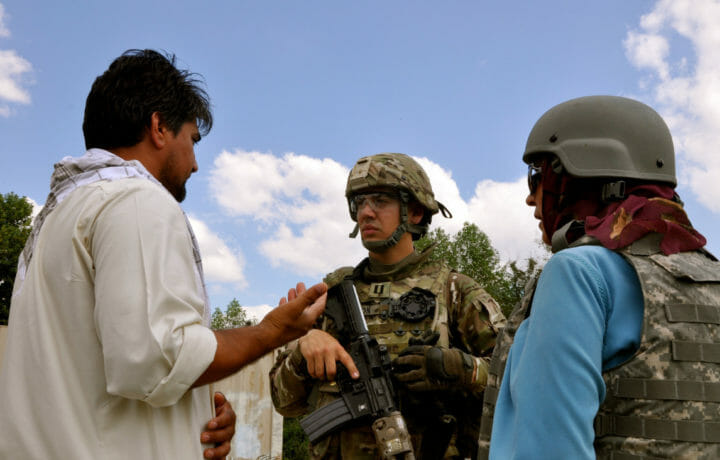Our translators in early 2002 warned us about abandonment issues that were so deeply held by Afghans after the U.S. left them following the Soviet departure. However, this week I joined an Afghan lawmaker, Canadian Diplomat, and British human rights activist to talk to hundreds of Afghans from around the globe at a three-hour conference about Pakistan’s interference in Afghan affairs. As the sole American on the panel, I got a lot of direct questions from Afghans still in shock after NATO rapidly withdrew their forces and closed their embassies, leaving Afghans and the interpreters who faithfully served other countries to face a terrorist invasion alone.
Years Rebuilding Trust Back to Square One
What Afghans are worried about is that if the Western world does come back to Afghanistan, it will just be a repeat of the same cycle. In 2002, my boss and I worked daily with Afghans as they formed their new government. The first thing we learned is that Afghans didn’t trust us. The deep cuts from other years were still open wounds. We worked hard to build trust with Afghans every day. We allowed Afghans to provide our security as we traveled to nearly every province with just a small personal protection team for the 2-star general, sometimes only one MP (sometimes only me).
Americans and other NATO nations would spend 19 years building trust with the Afghans by fighting beside them and empowering them, while they became educated and increased their independence. The long-term security agreements, and economic and diplomatic exchanges had built a more solid relationship. The wounds of abandonment from the 1990s were almost scarred over. Afghans were starting to see a bright future. But this year our abrupt departure was like taking a razor blade to the old wounds.
Now Afghans are back where they started in the 1990s, with terrorists all around them, an economy on life-support, and a government that has ceased to function. Afghans feel like they are bleeding out and the world isn’t even offering a band-aid.
Role of Pakistan in All of This
One of the big questions I was asked is why Pakistan gets away with lying to the U.S. and NATO. How can we allow them to openly support terrorists, and also pretend they are not? That is a fair question and I told them what diplomats have told me in recent months. First, Pakistan uses the safety of their nuclear weapons to blackmail nations into supporting the Pakistan military. Second, Pakistan is really good at public relations, messaging, and lobbying inside foreign national security circles. They use their Pakistani immigrants very well to convince other nations that Pakistan is the responsible nation in South Asia and the others are not. Finally, Pakistan is good at spinning the foreign press and even running the media operations in their nation.
I posed an idea that was not really contested by the hundreds in attendance. I reminded everyone that the war in Afghanistan was mostly a battle of narratives and that Afghans, and NATO, were really bad at it. It was suggested at the conference that Afghans globally begin to improve their long-term stability as a country by challenging Pakistani narratives in a unified way.
It was also offered that Afghans should better educate the world about why anyone should care about Afghanistan. I reminded the audience that most Americans still could not find their country on a map after 20 years and that just being a possible future source for terrorist threats was not enough to interest Americans, as the 1990s proved so well.
A House Divided Cannot Stand
Finally, we discussed how Pakistan keeps Afghans divided so that they spend their time fighting each other and not fighting their enemies. A mantra of the last few years was that Afghan unity was needed to defeat the Taliban. Afghan disunity in the endgame was exactly how the Taliban terrorist network bought their way to Kabul.
We discussed how ancestral and tribal squabbles kept Afghans busy arguing over unimportant concepts and history. We talked about how the overabundance of Afghan political parties kept any leader from forming a well-supported government. The Durand line/international border dispute was another topic discussed that helps Pakistan keep Afghans occupied in endless protest that resolves nothing. All of these smaller issues are part of what ensures Afghans remain somehow more critical of their own government, than their actual enemies. This is not unlike what Russian information operations have been doing to America in recent election cycles.
In the coming weeks and months as the Taliban regime and the world argue over how to govern Afghanistan, we can watch to see if the Afghan people in their home-country and around the globe can stop fighting among themselves and start to expose the terrorism and human right violations being imposed upon them in a constructive way. If Afghans can convince enough nations and international organizations to stop their neighbors from interfering in their affairs, they might have a chance at rebuilding a more democratic and stable state.

